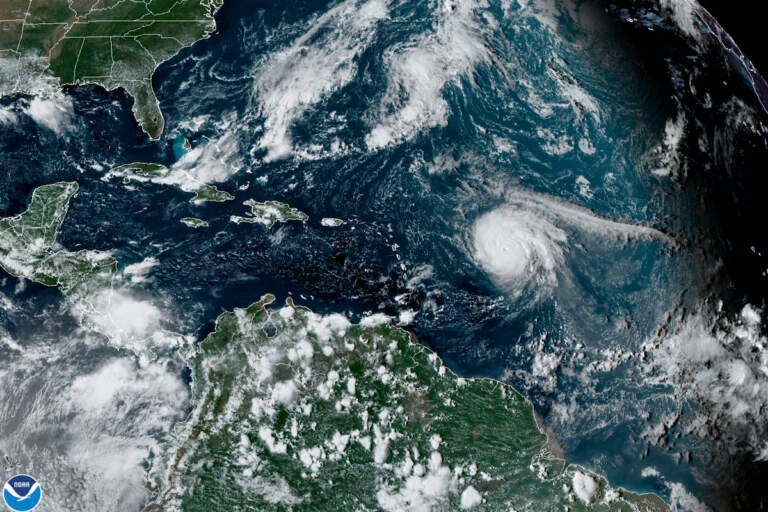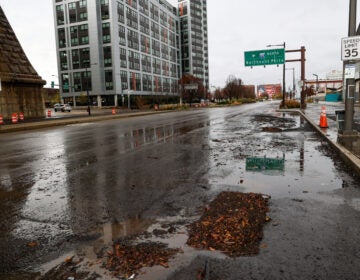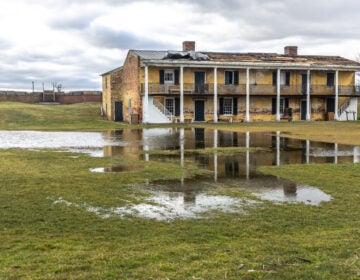Philly, get ready for another above-average hurricane season
Government forecasters are predicting up to six major hurricanes this year. Here’s how city officials suggest you prepare.

This satellite image provided by the National Oceanic and Atmospheric Administration shows Hurricane Sam, just right of center, in the Atlantic Ocean, Monday, Sept. 27, 2021, at 1920 Zulu (3:20 p.m. ET). (NOAA via AP)
Government forecasters are predicting yet another above-average Atlantic hurricane season, with several major hurricanes. Local emergency officials urge Philadelphians to prepare now, before storms hit.
“We know how last season went,” said Dominick Mireles, director of the City’s Office of Emergency Management. “So use today — use now, while the sun’s out, still shining — to get prepared.”
The National Oceanic and Atmospheric Administration (NOAA) forecasts 14 to 21 named storms between June 1 and November 30, including six to ten hurricanes — three to six of which could become major hurricanes (category 3, 4 or 5, with winds of at least 111 mph). NOAA’s predictions have a 70% probability. If they come true, this year could be the seventh above-average hurricane season in a row.
NOAA’s forecast comes less than a year after the remnants of Hurricane Ida brought at least seven tornadoes to the Philadelphia area, flooded businesses in Manayunk and Center City’s Vine Street Expressway, killed several people and displaced hundreds. The year before, Tropical Storm Isaias brought devastating flooding to Philly’s Eastwick neighborhood.
“We’ve seen really, really damaging and significant flooding several times just in the last two years,” OEM’s Mireles said.
This year, city officials plan to apply lessons learned during these recent floods.
“We learned so much about the value of being proactive and [responding] big quickly,” Mireles said.
‘Now is the time to get ready’
Emergency management officials emphasize that planning is important for staying safe and reducing your losses during a storm.
“Preparedness is key to the resilience that we need, and now is the time to get ready for the upcoming hurricane season,” said NOAA Administrator Richard Spinrad.
One way to get ready is by signing up for the city’s emergency text alert system, ReadyPhiladelphia, and making sure that government alerts are not disabled on your phone. The city has the ability to issue location-based weather alerts similar to AMBER Alerts, but does so sparingly, Mireles said, so it’s important to take them seriously.
“We don’t use that tool lightly,” he said. “So if you see something from the city, particularly through that system, chances are we’re really concerned.”
Another way to prepare is to know your flood risk, which you can check on FEMA’s flood mapping tool or explore through the city’s flooding guide. Flood insurance can help protect homeowners and renters from devastating losses, and recently became more affordable for many residents of the city’s most flood-prone neighborhood.
It’s also important to have a plan in case you need to evacuate your home or shelter in place. This can include making sure you have enough supplies to stay put for a few days, or gathering copies of important documents.
“Think about all the people in your home, and that includes pets,” Mireles said. “Do you need to have pet food set aside or a carrier that you might transport your furry friend in?”
City officials plan to err on the side of caution this year in activating emergency response plans, Mireles said. During the remnants of Ida, officials found success in setting up “reception centers” early — and may do this again.
“Where they really turned invaluable is overnight…as we were actively evacuating people, we already had a turnkey [shelter] with American Red Cross volunteers and Office of Emergency Management staff waiting at local high schools to receive individuals who were just evacuated.”
But in terms of big infrastructure fixes that could reduce the city’s flood risk, Mireles said these are in the idea phase, and will likely take a while to be funded and built.
The latest in a string of active hurricane seasons
Last year’s season was the third most active on record for named storms and the sixth consecutive above-normal Atlantic hurricane season.
Climate change is thought to increase the intensity of storms, but does not clearly impact their frequency. Scientists have found that warming doubles the chance of extreme Atlantic hurricane seasons, helping fuel stronger storms with more rainfall during the record-breaking 2020 hurricane season.
“We’re seeing such a dramatic change in the type of weather events that we’re facing as a result of climate change, that we really have to get ahead of that,” said FEMA Administrator Deanne Criswell.
The factors contributing to this year’s storm-filled outlook are La Niña, warmer-than-average sea surface temperatures, and an enhanced west African monsoon, according to NOAA. The agency says the effect of climate change on the strength and frequency of tropical cyclones is “a continuous area of study” for NOAA scientists.
“We can’t simply point to a particular storm, whether it’s a strong storm like Ida or any others, and say ‘there, that is climate change,’” NOAA’s Spinrad said. “The attribution is more in the patterns.”
To get storm information and emergency details from the city, Text READYPHILA to 888-777 for free text alerts or visit OEM’s website at www.phila.gov/ready to customize your free text or emails, including flood forecasts on area waterways.
WHYY is your source for fact-based, in-depth journalism and information. As a nonprofit organization, we rely on financial support from readers like you. Please give today.










